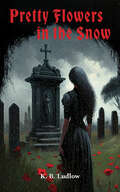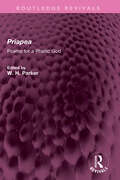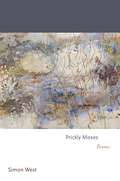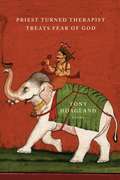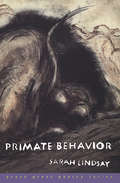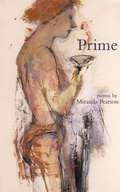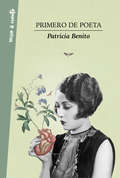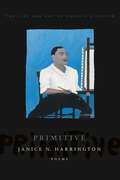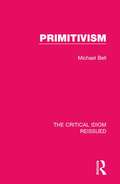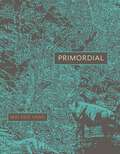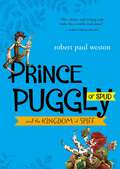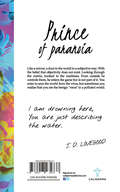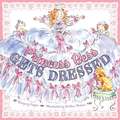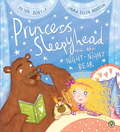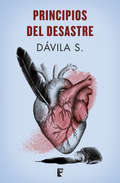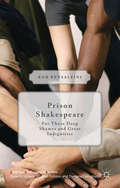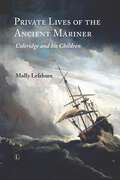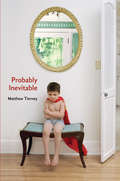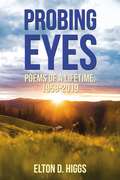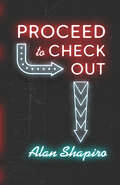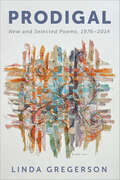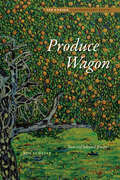- Table View
- List View
Pretty Flowers In the Snow
by K. B. LudlowEnter a world of dream and reality. Where the afterlife and our world meet. Where the beginning is the end and the end is the beginning. Where death, horror, the surreal, reality and pain meet. Gothic and surreal overtones are just some of the ideas that permeate this collection of poems. Pretty Flowers in the Snow is the second book of the ‘Poppy’ trilogy, revealing that the world Lilith entered is full of flowers, smothered by snow. The flowers are a reflection of her and the torment she is in.
Priapea: Poems for a Phallic God (Routledge Revivals)
by W. H. ParkerFirst published in 1988, Priapea is a collection of eighty Latin epigrams, English translated, that make up the corpus Priapeorum, which displays remarkable skill, artistry and wit. Their elegance of style contrasts strikingly with their indecent subject matter. The poems are mostly spoken by, or addressed to, the lewd god Priapus, famous for the size and tenseness of his erect membrum virile or phallus. A main theme is the threatened use of his formidable organ to assault obscenely any intruders that he may catch thieving, but requests and offsprings made to Priapus, and his comparison of himself with other deities, also figure prominently among the poems. This book will be of interest of literature, classical studies, and translation studies.
Prickly Moses: Poems
by Simon WestCompelling poems that celebrate language as it encounters the nameless variety of the natural world, from Australia to ItalyAn uncanny blend of the external and the intimate has been a hallmark of Simon West’s poetry for nearly twenty years. In this new collection, the Australian poet and Italianist delights in the transforming and endlessly varied powers of naming and speaking. West’s intensely regional focus stands in dialogue with Europe and antiquity. Landscapes reveal the tangle of their historical dimensions, as the rivers of both the Goulburn Valley in southeastern Australia and the Po Valley in northern Italy merge and flow into the wider currents of the Southern Ocean. Again and again, language and the senses throw themselves into the nameless riot of the world, from eucalypts and clouds to a medieval bell tower and the sounds a pencil makes as it crosses a page.
Priest Turned Therapist Treats Fear of God: Poems
by Tony Hoagland“Hoagland’s verse is consistently, and crucially, bloodied by a sense of menace and by straight talk.” —The New York TimesMy heroes are the ones who don’t say much.They don’t hug people they just met.They don’t play louder when confused.They use plain language even when they listen.Wisdom doesn’t come to every Californian.Chances are I toowill die with difficulty in the dark.If you want to see a lost civilizaton,why not look in the mirror?If you want to talk about love, why not beginwith those marigolds you forgot to water?—from “Real Estate”Tony Hoagland’s poems interrogate human nature and contemporary culture with an intimate and wild urgency, located somewhere between outrage, stand-up comedy, and grief. His new poems are no less observant of the human and the worldly, no less skeptical, and no less amusing, but they have drifted toward the greater depths of open emotion. Over six collections, Hoagland’s poetry has gotten bigger, more tender, and more encompassing. The poems in Priest Turned Therapist Treats Fear of God turn his clear-eyed vision toward the hidden spaces—and spaciousness—in the human predicament.
Primate Behavior: Poems
by Sarah LindsayOnce in a generation a young poet arrives with such an unexpected and compelling vision that readers take notice right from the start. With Primate Behavior Sarah Lindsay makes just such a debut. Her exuberant, witty, and outrageous poems have already stunned and delighted the readers of some of America's best magazines and journals. Primate Behavior is the product of a wild and exhilarating imagination, ranging wide across an abundant imaginary landscape. Sarah Lindsay writes of space migration and the cave paintings of 35,000 B.C. Her poems speak from the perspective of an embalmed mummy and detail the adventures of nineteenth century explorers. Lindsay investigates the world as no one has yet had the daring and inspiration to do, reanimating history and folk legend and setting in motion curious new worlds that speak eccentrically, but unmistakably, to their own. Primate Behavior is a remarkably sustained and self-assured performance. The Grove Press Poetry Series, which has brought the public both powerful retrospectives and the work of authors in mid-career, now introduces an exciting new poet, Sarah Lindsay. Sarah Lindsay's molten imagination burns new channels for poetry. No lie. - Kay Ryan; As a poet, Sarah Lindsay is fearless. Subjects others would find unpromising or intimidating she forms into poems of eerie, spectral beauty. Antarctic exploration, astronomical theory, the lungfish, the manatee, and the rotting orange-even Superman's puberty!-all are transmuted from strange Idea into graceful Song. Primate Behavior is a must read. - Fred Chappell.
Prime
by Miranda PearsonIn Prime, Miranda Pearsons first collection of poetry, the narratives of female identity, the white wedding, and the enshrined position of the mother are interrogated, using the lyric as a form of cultural critique in an examination and mockery of romantic love and heterosexual relationships. At the same time, the poems constitute an irreverent, lush romp, a celebration of friendship and absurdity. Gritty and darkly humorous, Pearsons verses address modern myths head-on in a world where love watches itself critically and consciously. Everything is unravelled in poems that disentangle pregnancy from motherhood, custody from caregiving, marriage from love, sex from gender, only to weave these concepts back together in startling new patterns. Pearson deliberately trips over the picket fences of proprieties and sensitivities that surround the New Age marriage. The sacred and profane are crossed daily with frankness, toughness, and warmth. In Prime, British humour and psychoanalytic and feminist theory meet under the poets steady gaze.
Primero de poeta
by Patricia BenitoEl libro de poesía que, autoeditado por su autora, escaló las listas de Amazon y ha conquistado a miles de lectores. «Vive, joder, vive. Y si algo no te gusta, cámbialo. Y si algo te da miedo, supéralo. Y si algo te enamora, agárralo.» Primero de poeta son todos los papeles que rellené y quemé, todos los pasos que no di, las vidas que perdí. Todas las declaraciones de amor que callé, los sueños que rompí, los miedos de los que aprendí. Es mi impaciencia, mis ganas de sentir y el pánico. Es descubrir que mis miedos siempre ganan la partida. Es empujarte a que te vayas por si te acercas demasiado. Es querer que te acerques demasiado. Primero de poeta son todos mis errores. Y mi cura. La opinión de los lectores:«Cada página es una confesión desnuda y sincera de la autora, de esas que te hacen partícipe de principio a fin porque sabes que son auténticas, porque están escritas con el lenguaje que compartimos todos, el del dolor y el de la alegría, el del miedo y el del amor, en definitiva, el lenguaje del alma. Recomiendo tenerlo para ojearlo con cuidado de vez en cuando, porque al menos a mí, me hace sentir cosas de las cuales no quiero abusar y "gastarlas" demasiado rápido.»Chris «Para los amantes del buen gusto, de lo bonito, de lo que toca el alma. Por encontrarme reflejada en muchos de esos renglones, hacerme sonreír y también hacerme reflexionar. Por todo eso y por mucho más, es un libro para leer al menos una vez en la vida.»Inma «A cada poema te enamoras más de Patricia, porque te hace sentir y recordar emociones cotidianas que a veces podemos tener olvidadas. Recomendable 100%, para leer y releer.»Inma Naroi «Una poesía moderna, directa, de pensamientos ágiles y muy cercana, con partes que invitan a la reflexión.»Cliente Amazon
Primero de poeta
by Patricia BenitoEl libro de poesía que, autoeditado por su autora, escaló las listas de Amazon y ha conquistado a miles de lectores. «Vive, joder, vive. Y si algo no te gusta, cámbialo. Y si algo te da miedo, supéralo. Y si algo te enamora, agárralo.» Primero de poeta son todos los papeles que rellené y quemé, todos los pasos que no di, las vidas que perdí. Todas las declaraciones de amor que callé, los sueños que rompí, los miedos de los que aprendí. Es mi impaciencia, mis ganas de sentir y el pánico. Es descubrir que mis miedos siempre ganan la partida. Es empujarte a que te vayas por si te acercas demasiado. Es querer que te acerques demasiado. Primero de poeta son todos mis errores. Y mi cura. La opinión de los lectores:«Cada página es una confesión desnuda y sincera de la autora, de esas que te hacen partícipe de principio a fin porque sabes que son auténticas, porque están escritas con el lenguaje que compartimos todos, el del dolor y el de la alegría, el del miedo y el del amor, en definitiva, el lenguaje del alma. Recomiendo tenerlo para ojearlo con cuidado de vez en cuando, porque al menos a mí, me hace sentir cosas de las cuales no quiero abusar y "gastarlas" demasiado rápido.»Chris «Para los amantes del buen gusto, de lo bonito, de lo que toca el alma. Por encontrarme reflejada en muchos de esos renglones, hacerme sonreír y también hacerme reflexionar. Por todo eso y por mucho más, es un libro para leer al menos una vez en la vida.»Inma «A cada poema te enamoras más de Patricia, porque te hace sentir y recordar emociones cotidianas que a veces podemos tener olvidadas. Recomendable 100%, para leer y releer.»Inma Naroi «Una poesía moderna, directa, de pensamientos ágiles y muy cercana, con partes que invitan a la reflexión.»Juan
Primitive: The Art and Life of Horace H. Pippin
by Janice N. HarringtonA biographical reflection on the art and life of Horace H. Pippin-the best-known African-American artist of his time-Primitive is a critique on current perceptions surrounding African-American folk art, as well as the absence of key African-American history in present-day curricula. Award-winning poet Janice Harrington connects readers with a fascinating, odds-defying artist, all while underscoring the human need for artistic expression.
Primitivism (The Critical Idiom Reissued #19)
by Michael BellFirst published in 1972, this books examines the subject of primitivism through the study of the work of a number of major writers, including D. H. Lawrence, Herman Melville, Joseph Conrad, T. S. Eliot and James Joyce. It looks at the variety of definitions and uses of primitivism and how the idea has changed over time as well as with each writer. In doing so, it is argued that primitivism denotes, or arises from, a sense of crisis in civilization and it is born of the interplay between the civilized self and the desire to reject or transform it. This book will be of interest to those studying modern literature.
Primordial: Poems
by Mai Der VangMai Der Vang’s poetry—lyrically insistent and visually compelling—constitutes a groundbreaking investigation into the collective trauma and resilience experienced by Hmong people and communities, the ongoing cultural and environmental repercussions of the war in Vietnam, the lives of refugees afterward, and the postmemory carried by their descendants. Primordial is a crucial turn to the ecological and generational impact of violence, a powerful and rousing meditation on climate, origin, and fate.With profound and attentive care, Vang addresses the plight of the saola, an extremely rare and critically endangered animal native to the Annamite Mountains in Laos and Vietnam. The saola looks like an antelope, with two long horns, and is related to wild cattle, though the saola has been placed in a genus of its own. Remarkably, the saola has only been known to the outside world since 1992, and sightings are so rare that it has now been more than a decade since the last known image of one was captured in a camera trap photo in 2013.Primordial examines the saola’s relationship to Hmong refugee identity and cosmology and a shared sense of exile, precarity, privacy, and survival. Can a war-torn landscape and memory provide sanctuary, and what are the consequences for our climate, our origins, our ability to belong to a homeland? Written during a difficult pregnancy and postpartum period, Vang’s poems are urgent stays against extinction.
Prince Puggly of Spud and the Kingdom of Spiff
by Robert Paul WestonThe next middle-grade rhyming novel from the award-winning author of Zorgamazoo!Prince Puggly of the muddy, terminally unfashionable Kingdom of Spud is surprised when he receives an invitation to a lavish ball in the far more chic Kingdom of Spiff. Puggly is sure that the Spiffs will take one look at him and laugh him out of their kingdom. And that’s exactly what they do. . . . But then Puggly meets Francesca, the bookish Princess of Spiff, and together the two set out to teach Francesca’s Spiffian countrymen an absurd lesson in style. Award-winning author Robert Paul Weston once again delivers a humorous fantasy in rhyming verse that just begs to be read aloud. And this time, it comes with a message that’s sure to impress: There’s more to a person than how they are dressed.
Prince of paranoia: It was before wizards went underground
by J. D. LovegoodI am drowning here, You are just describing the water. Like a mirror, a door to the world in a subjective way. With the belief that objectivity does not exist. Looking through the matrix, hooked to the machines. From outside he controls them, he enters the game but is not part of it. You enter to save the world from the virus, but sometimes you realize that you are the benign virus «in a polluted world».
Princess Bess Gets Dressed
by Margery CuylerA fashionably dressed princess reveals her favorite clothes at the end of a busy day.
Princess Sleepyhead and the Night-Night Bear
by Peter BentlyCuddle up together with this sweet and funny bedtime story. Perfect for tricky bedtimes!The moon's in the sky and the kingdom's asleep.The cows are all slumbering. So are the sheep.The ducks are tucked up in the roots of the willow.The rabbit is drowsily nibbling his pillow . . .Night has fallen, and everyone is snuggled up and snoozing. All except Princess Sleepyhead...She's tried running, jumping, counting and chasing, but it's no use. She just can't get to sleep!Luckily the Night-Night Bear is on hand to help. He knows that what every little princess needs at bedtime is a story and a goodnight hug.From a Roald Dahl Funny Prize-winning author and a bestselling illustrator!
Principios del desastre
by Dávila S.Principios del desastre es el primer libro de poemas de Dávila S. Luces y sombras Tus ojos son esos orbesverdes que parpadeanen medio de la noche,deslumbrando las acerasy los cielos,mostrando ese suspirode luz que te define. ¿Podrá mi oscuridadluchar contra el vacíode tenerte sin tenerte,sin ser mío el tiemposuficiente, en estos ojostuyos que hoy me entienden? Tus labios parecensaber todas las respuestas.
Prison Shakespeare: For These Deep Shames and Great Indignities (Palgrave Shakespeare Studies)
by Rob PensalfiniThis book explores the development of the global phenomenon of Prison Shakespeare, from its emergence in the 1980s to the present day. It provides a succinct history of the phenomenon and its spread before going on to explore one case study the Queensland Shakespeare Ensemble's (Australia) Shakespeare Prison Project in detail. The book then analyses the phenomenon from a number of perspectives, and evaluates a number of claims made about the outcomes of such programs, particularly as they relate to offender health and behaviour. Unlike previous works on the topic, which are largely individual case studies, this book focuses not only on Prison Shakespeare's impact on the prisoners who directly participate, but also on prison culture and on broader social attitudes towards both prisoners and Shakespeare.
Private Lives of the Ancient Mariner: Coleridge and his Children
by Molly LefebureA fascinating new study of Samuel Taylor Coleridge, 'Private Lives of the Ancient Mariner' illuminates the poet's deeply troubled personality and stormy personal life through a highly original study of his relationships. In her last published work the celebrated Coleridgean, Molly Lefebure, provides profound psychological insights into Coleridge through a meticulous study of his domestic life, drawing upon a vast and unique body of knowledge gained from a lifetime's study of the poet, and making skilful use of the letters, poems and biographies of the man himself and his family and friends. The author traces the roots of Coleridge's unarguably dysfunctional personality from his earliest childhood; his position as his mother's favoured child, the loss of this status with the death of his father, and removal to the 'Bluecoat' school in London. Coleridge's narcissistic depression, flamboyance, and cold-hearted, often cruel, rejection of his family and of loving attachments in general are examined in close detail. The author also explores Coleridge's careers in journalism and politics as well as poetry, in his early, heady 'jacobin' days, and later at the heart of the British wartime establishment at Malta. In both of these arenas Coleridge exerted his talents to brilliant effect, although they have often been overlooked in appraisals of his works. His virtual abandonment of his children and tragic disintegration under the influence of opium are included in the broad sweep of the book which also encompasses an examination of the lives of Coleridge's children, upon whom the manipulations of the father left their destructive mark. Molly Lefebure unravels the enigma that is Coleridge with consummate skill in a book which will bring huge enjoyment to any reader with an interest in the poet's life and times.
Prize Cache: A Collection of Writings
by Riley Nicholas KellyStories, fiction and articles in this book were written by Riley Nicholas Kelly over a period of two decades during his career as a newspaper editor, free-lance writer and poet. Ten of the seventeen offerings received various literary awards.
Probably Inevitable
by Matthew TierneyThese are high-energy poems, riddled with wit and legerdemain and jolted by the philosophy and science of time. 'Time's not the market, it's the bustle; / not the price but worth," he muses, sailing through the rhythms and algorithms of a world made concrete by Samuel Johnson, before it was undone by Niels Bohr. Tierney's narrators grapple with the gap between what's seen and what's experienced, their minds tuned to one (probably) inevitable truth: the more I understand, the more I understand I'm alone. What continues to set Matthew Tierney's poems apart is their uncanny ability to find within the nomenclature of science not mere novelty but a new path to human frailty, a renewed assertion of individuality, and a genuine awe at existence.
Probing Eyes: Poems of a Lifetime, 1959-2019
by Elton HiggsProbing Eyes is a collection of 156 poems written over a period of 60 years by a Christian professor of English literature. The first and largest section is called &“Scriptural Extensions,&” and it seeks to throw fresh light on various Scriptural situations by either projecting the personality of a character though a dramatic monologue or offering a fresh slant on the events depicted. These poems proceed from asking the question, &“I wonder what this biblical character was thinking in the midst of these events.&” The second section, &“Interactions,&” presents some of the author&’s experiences in interfacing with others, from family and friends to people only casually known. The third section, &“Perspectives on Time, consists of poems written mostly as New Year&’s meditations, dealing with how we as Christians are affected by the passage of time; while the inexorable flow of time reminds of our finiteness and mortality, it also challenges us to understand how God, Who is timeless, is master of our limitations. The final section, &“Personal and Meditative,&” is a miscellanea of personal and occasional ruminations, some serious and others playful. The book has four indexes to facilitate finding a poem by title, chronological placement, Scriptural reference, or topic. The author hopes that these poems will thus lend themselves to use for private Bible study and sermon or worship application. The most fruitful reading of the poems, especially of those for which a Scriptural reference is given, will come from a careful look at the relevant biblical texts.This book is not presented as the work of a main-stream poet, for Prof. Higgs has pursued his poetry writing as an avocation, not a profession. He has opted for clarity over artistic sophistication, which may not commend him to contemporary critics and practitioners of poetic composition. At the same time, the author aspires to go beyond the kind of religious versification whose primary purpose is to convey a moral lesson through rhyming lines. That is not an ignoble objective, but it does not embrace a full participation in the linguistic complexity that characterizes serious poetry. Dr. Higgs seeks in his poems to combine the beauty of art with the beauty of Truth, and thereby to stimulate fresh attention to who God is and how He works with the people of His creation.The style of Probing Eyes is mainly free verse, but with regular use of internal rhyme, assonance, and alliteration. The reader may see reflected in this style Prof. Higgs&’s admiration for the poetry of Gerard Manly Hopkins, George Herbert, John Donne, and (in conversational tone) Robert Frost. But above all, the author hopes that readers find evidence of the influence of the Holy Spirit, ad gloriam dei.XXXXXXX
Proceed to Check Out (Phoenix Poets)
by Alan ShapiroAward-winning poet Alan Shapiro offers a new collection of poems reflecting on mortality and finitude. Alan Shapiro’s fourteenth collection of poetry, Proceed to Check Out, is a kind of summing up, or stock-taking, by an aging poet, of his precarious place in a world dominated by the ever-accelerating pace of technological innovation, political disruption, personal loss, and racial strife. These poems take on fundamental subjects—like the nature of time and consciousness and how or why we become who we are—but Shapiro presses them into becoming urgent and timely. Employing idiomatic range and formal variety, Shapiro’s poems move through recurring dreams, the coercions of childhood, and the mysterious connections of mind and matter, pleasure and memory. They meet an abiding need to find empathy and understanding in even the most challenging places—amid disaffection, public discord, and estrangement. His grasp of contemporary life—in all its insidious violence and beauty—is distinct, comprehensive, and profound.
Prodigal: New and Selected Poems, 1976–2014
by Linda GregersonIn her first book of collected work, prize-winning poet Linda Gregerson mines nearly forty years of poetry, bringing us a full range of her talents. Ten new poems introduce Prodigal, followed by fifty poems, culled from Gregerson's five collections, that range broadly in subject from class in America to our world's ravaged environment to the wonders of parenthood to the intersection of science and art to the passion of the Roman gods, and beyond. This selection reinforces Gregerson&’s standing as &“one of poetry&’s mavens . . . whose poetics seek truth through the precise apprehension of the beautiful while never denying the importance of rationality&” (Chicago Tribune). A brilliant stylist, known for her formal experiments as well as her perfected lines, Gregerson is a poet of great vision. Here, the growth of her art and the breadth of her interests offer a snapshot of a major poet's intellect in the midst of her career.
Produce Wagon: New and Selected Poems (Ted Kooser Contemporary Poetry)
by Roy ScheeleThe poems in Produce Wagon explore the vast and varied circumstances of the human experience. Roy Scheele delves into his love for his wife in &“Remembrances,&” the opening poem from his first chapbook, and &“Driving after Dark&”; his fascination with the natural world in poems such as &“How the Fox Got Away&” and &“Late Autumn Woods&”; his appreciation of his family in &“A Kitchen Memory&” and &“The Long Rise&”; and his fondness for stories in &“The Carny Circuit&” and &“In the Clear.&” In these and the other poems in the collection, Scheele uses a variety of traditional verse forms as well as free verse and syllabics, carefully fitting the form of each poem to his subject matter. Though most of the poems are set in Nebraska and neighboring states, there is a universality to the subjects Scheele addresses. In these poems anywhere is everywhere.
Producing Women's Poetry, 1600-1730
by Gillian WrightProducing Women's Poetry is the first specialist study to consider English-language poetry by women across the seventeenth and early eighteenth centuries. Gillian Wright explores not only the forms and topics favoured by women, but also how their verse was enabled and shaped by their textual and biographical circumstances. She combines traditional literary and bibliographical approaches to address women's complex use of manuscript and print and their relationships with the male-generated genres of the traditional literary canon, as well as the role of agents such as scribes, publishers and editors in helping to determine how women's poetry was preserved, circulated and remembered. Wright focuses on key figures in the emerging canon of early modern women's writing, Anne Bradstreet, Katherine Philips and Anne Finch, alongside the work of lesser-known poets Anne Southwell and Mary Monck, to create a new and compelling account of early modern women's literary history.
